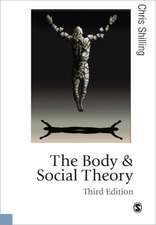The Social Theory of W.E.B. Du Bois
Autor Philip Zuckermanen Limba Engleză Paperback – 13 apr 2004
Preț: 791.76 lei
Preț vechi: 965.57 lei
-18% Nou
Puncte Express: 1188
Preț estimativ în valută:
151.52€ • 157.23$ • 126.65£
151.52€ • 157.23$ • 126.65£
Carte tipărită la comandă
Livrare economică 15-29 martie
Preluare comenzi: 021 569.72.76
Specificații
ISBN-13: 9780761928713
ISBN-10: 0761928715
Pagini: 224
Dimensiuni: 178 x 254 x 13 mm
Greutate: 0.41 kg
Ediția:New.
Editura: SAGE Publications
Colecția Sage Publications, Inc
Locul publicării:Thousand Oaks, United States
ISBN-10: 0761928715
Pagini: 224
Dimensiuni: 178 x 254 x 13 mm
Greutate: 0.41 kg
Ediția:New.
Editura: SAGE Publications
Colecția Sage Publications, Inc
Locul publicării:Thousand Oaks, United States
Recenzii
"This is a useful collection insofar as it will help readers obtain an appreciation of the wide range of social concerns and problems that DuBois addressed during his long lifetime."
Cuprins
Introduction - Phil Zuckerman
Chapter I: On the Meaning of Race
1. "The Conservation of Races"
2. "Of Our Spiritual Strivings"
3. "The First Universal Races Congress"
4. "Does Race Antagonism Serve Any Good Purpose?"
5. "Africa and the Slave Trade"
6. "The Souls of White Folk"
7. "Social Equality and Racial Intermarriage"
8. "Should the Negro be Encouraged to Seek Cultural Equality?"
9. "The Concept of Race"
10. "The Negro and the Warsaw Ghetto"
Chapter II: On Race Relations
1. "Color Prejudice"
2. "Relations of Negroes to Whites in the South"
3. "The Negro Problem"
4. "Bleeding Ireland"
5. "The Shape of Fear"
6. "Segregation"
7. "Anti-Semitism"
8. "My Evolving Program for Negro Freedom"
9. "Bound by the Color Line"
Chapter III: On International Relations
1. "The Hands of Ethiopia"
2. "Colonies"
3. "The Trade in Men"
4. "Mexico and Us"
5. "The Future of Europe in Africa"
6. "Colonialism, Democracy, and Peace After the War"
8. "Prospect of a World Without Racial Conflict"
9. "The Disfranchised Colonies"
10. "Peace is Dangerous"
Chapter IV: On Labor, Economics, and Politics
1. "Servants"
2. "The Value of Agitation"
3. "Of the Ruling of Men"
4. "Of Giving Work"
5. "Business as Public Service"
6. "Employment"
7. "Economic Disenfranchisement"
8. "Marxism and the Negro Problem"
9. "The Use of Capital"
10. "The Release of Earl Browder"
11. "Human Rights for all Minorities"
12. "We Must Know the Truth"
13. "America's Pressing Problems"
14. "There Must Come a Vast Social Change in the US"
Chapter V: On Women
1. "The Black Mother"
2. "Woman Suffrage"
3. "The Damnation of Women"
4. "The Freedom of Womanhood"
Chapter VI: On Religion
1. "The Function of the Negro Church"
2. "Of the Faith of the Fathers"
3. "Immortality"
4. "Missions and Mandates"
Chapter VII: On Crime
1. "The Negro Criminal"
2. "The Relations of Negroes to Whites in the South"
3. "Notes on Negro Crime, Particularly in Georgia."
4. "Morals and Manners"
5. "Lynched by Years, 1885-1914"
Chapter VIII: On Education
1. "The Talented Tenth"
2. "Education"
3. "Education"
4. "The Negro College"
5. "The Freedom to Learn"
Index
Chapter I: On the Meaning of Race
1. "The Conservation of Races"
2. "Of Our Spiritual Strivings"
3. "The First Universal Races Congress"
4. "Does Race Antagonism Serve Any Good Purpose?"
5. "Africa and the Slave Trade"
6. "The Souls of White Folk"
7. "Social Equality and Racial Intermarriage"
8. "Should the Negro be Encouraged to Seek Cultural Equality?"
9. "The Concept of Race"
10. "The Negro and the Warsaw Ghetto"
Chapter II: On Race Relations
1. "Color Prejudice"
2. "Relations of Negroes to Whites in the South"
3. "The Negro Problem"
4. "Bleeding Ireland"
5. "The Shape of Fear"
6. "Segregation"
7. "Anti-Semitism"
8. "My Evolving Program for Negro Freedom"
9. "Bound by the Color Line"
Chapter III: On International Relations
1. "The Hands of Ethiopia"
2. "Colonies"
3. "The Trade in Men"
4. "Mexico and Us"
5. "The Future of Europe in Africa"
6. "Colonialism, Democracy, and Peace After the War"
8. "Prospect of a World Without Racial Conflict"
9. "The Disfranchised Colonies"
10. "Peace is Dangerous"
Chapter IV: On Labor, Economics, and Politics
1. "Servants"
2. "The Value of Agitation"
3. "Of the Ruling of Men"
4. "Of Giving Work"
5. "Business as Public Service"
6. "Employment"
7. "Economic Disenfranchisement"
8. "Marxism and the Negro Problem"
9. "The Use of Capital"
10. "The Release of Earl Browder"
11. "Human Rights for all Minorities"
12. "We Must Know the Truth"
13. "America's Pressing Problems"
14. "There Must Come a Vast Social Change in the US"
Chapter V: On Women
1. "The Black Mother"
2. "Woman Suffrage"
3. "The Damnation of Women"
4. "The Freedom of Womanhood"
Chapter VI: On Religion
1. "The Function of the Negro Church"
2. "Of the Faith of the Fathers"
3. "Immortality"
4. "Missions and Mandates"
Chapter VII: On Crime
1. "The Negro Criminal"
2. "The Relations of Negroes to Whites in the South"
3. "Notes on Negro Crime, Particularly in Georgia."
4. "Morals and Manners"
5. "Lynched by Years, 1885-1914"
Chapter VIII: On Education
1. "The Talented Tenth"
2. "Education"
3. "Education"
4. "The Negro College"
5. "The Freedom to Learn"
Index
Notă biografică
Phil Zuckerman, Ph.D., is Assistant Professor of Sociology at Pitzer College, Claremont, CA. He is currently teaching Classical Sociological Theory, Contemporary Sociological Theory, Deviance, Crime and Punishment in the U.S., Introduction to Sociology, Sociology of Religion, Sex and Religion, and a Senior Seminar/Capstone Course.
Descriere
W. E. B. Du Bois was a political and literary giant of the 20th century, publishing over twenty books and thousands of essays and articles throughout his life. In The Social Theory of W. E. B. Du Bois, editor Phil Zuckerman assembles Du Bois's work from a wide variety of sources, including articles Du Bois published in newspapers, speeches he delivered, selections from well-known classics such as The Souls of Black Folk and Darkwater, and lesser-known, hard-to-find material written by this revolutionary social theorist. This book offers an excellent introduction to the sociological theory of one of the 20th century's intellectual beacons.










